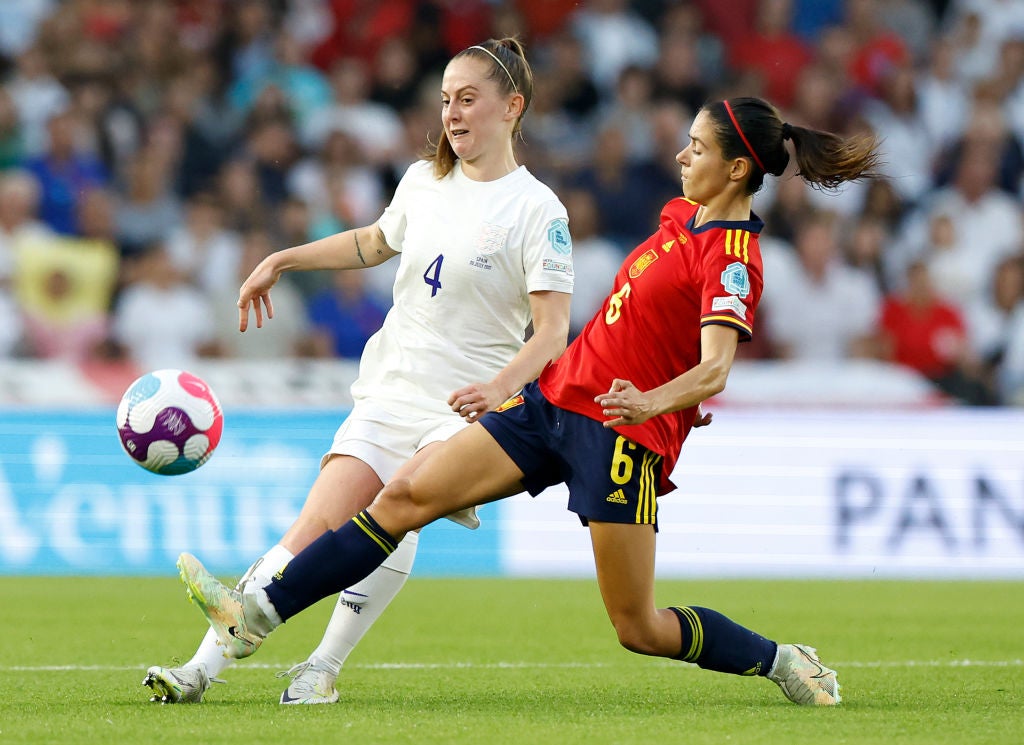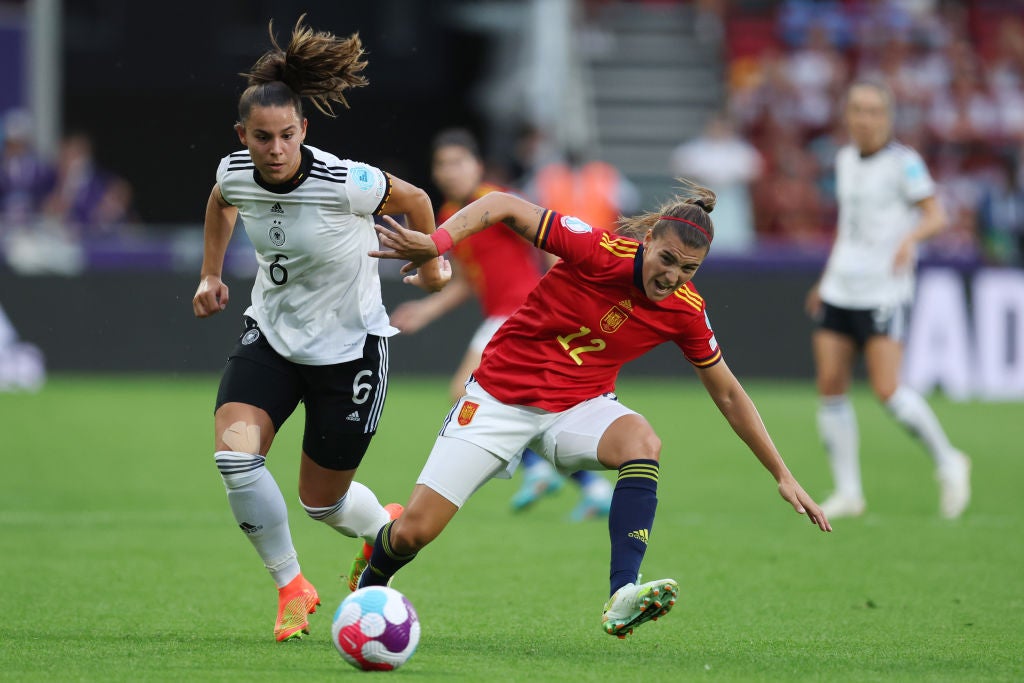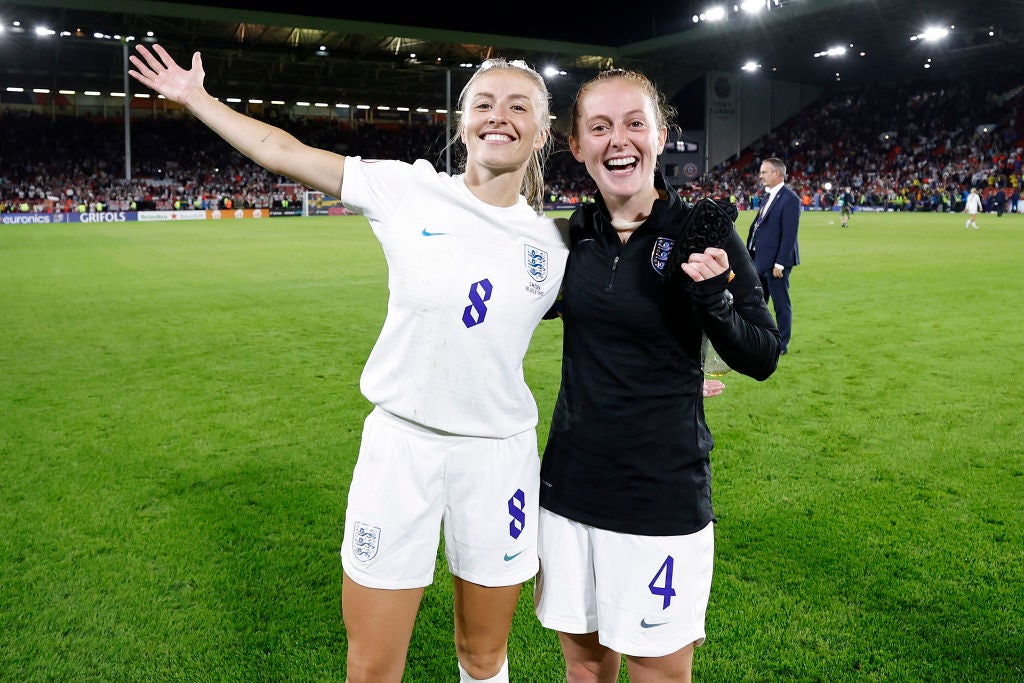
In the middle of the vast expanse of Wembley will be two players whose impact in reaching the Euro 2022 final may only be matched by their importance in determining its outcome. For England, the intelligence of Keira Walsh and the confidence of her passing in midfield has been illustrative of the cool and calculated plans of her manager Sarina Wiegman. On the other side, Lena Oberdorf has represented a fresh, bold Germany team, whose strength and assurance has grown throughout the tournament to set up this most intriguing of finals.
There will, of course, be plenty of other parts at play when the Lionesses face Germany in front of a record-breaking crowd of 87,000 at Wembley but in the battlegrounds of midfield, the most significant pressure will be exerted on the two opposing and contrasting pillars of either side. In what will be the biggest match of their lives, any cracks that show could be fatal.
It is not the role of the defensive midfielder to be the star of the show but while Beth Mead, Alessia Russo and Georgia Stanway have taken their turns to be England’s hero throughout Euro 2022, it has been the performances of Walsh that have arguably been the most impressive on their run to the final. Walsh remains a player who can slip under the radar when everything is ticking nicely alongside her, even if the 25-year-old is integral to the midfield working efficiently.

Walsh is England’s beacon in midfield and, as a country, her talents have been notoriously difficult to reproduce. At age 17, her ability was so rare that during open trials for Manchester City’s development squad, she was offered a place in the first team and made her senior debut within the month. An accurate passer with the vision to understand the space around her, Walsh is always available to receive possession, including in tight situations where she is required to turn before playing the ball. “She is up there unrivalled with the most intelligent players I have ever worked with,” said the former City manager Nick Cushing, who signed her from Blackburn Rovers.
The midfielder spoke openly after the 2019 World Cup about how criticism of her performances affected her during England’s time in France and, although the Lionesses have gone one step further by reaching the final at Euro 2022, it does not mean there has been an absence of difficult moments. The quarter-final against Spain was the toughest test of the tournament, not just for Walsh but for England collectively, and she was unable to be as influential in possession in the face of the Spanish press.
Oberdorf will pose a similar challenge, but with a considerably more bruising edge than Spain. No other player has made more tackles during the Euros than the 20-year-old midfielder, who was once again immense as Germany defeated France to reach the final. Her performances throughout the Euros have been absurdly high, offering a dynamism and energy in midfield that at times looks as if it has to be down to two players. While Walsh is able to find gaps by turning on the spot and picking a pass, Oberdorf is more likely to burst through them by making an interception and breaking forwards.

Oberdorf has been hailed not only as one of Europe’s biggest talents but also as a contender for the player of the tournament award. She takes on a similar role to Walsh in midfield. They operate, by and large, as single pivots and occupy the deeper central position of the midfield three, as well as assuming significant responsibility. Against France, where Germany were made to adapt to their opponent’s direct play, Oberdorf was required to cover both channels but always appeared in the right place to shut down opposition attacks, displaying a remarkably clear reading of the game.
This comes into play in the other direction, too, when Oberdorf steps out of midfield to lead the German press. Against England, her target will be set squarely on Walsh. It sets up the duel of whether Oberdorf can apply enough pressure to break England’s key cog and win possession high up the pitch, or if Walsh can evade her charging runs and snapping challenges before exploiting the spaces left in behind. Germany will want England to have more of the ball, just as they did against Spain, but with a player like Walsh making her team tick, that could be a dangerous game to play.
The proficiency of Wiegman’s coaching means England also have other avenues if Oberdorf swarms Walsh. Leah Williamson is the only other England player to have completed more passes than Walsh at the tournament, and the defender’s ability to play out from the back and between the lines will be crucial if Walsh is unavailable to receive. England can also get out through Lucy Bronze, who can dribble and come inside from right back. The Lionesses have also utilised switches to Lauren Hemp or Mead throughout Euro 2022, as well as going direct to Ellen White or Russo and bringing runners into play.

There will be other battles, too. Staying in midfield, Fran Kirby and Lina Magull can both expect to have time and space to roam, the question being how Germany and England can shut them down, with Oberdorf and Walsh likely to come into that equation as well. Stanway’s match-up with Sara Dabritz should be the most direct of the three and, while the German midfielder is also an imposing presence, Stanway has carried far more threat on the ball.
Out wide, Germany utilise strong, purposeful runners. The combination of Giulia Gwinn and Svenja Huth on the right flank and the directness of their movement could pose a threat to Rachel Daly. On the other side, Klara Buhl has been one of the players of the tournament and if she is able to return following her positive Covid-19 test, her dribbling and ability to glide either inside or out will test England’s Bronze. Jule Brand, who started against France, will ask the same questions if Buhl is indeed ruled out again.
But it should be midfield that provides the most important fight for the balance of the match, as two opposite forces push and pull in the contest for control.
England vs Germany, Euro 2022 final, kicks off at 5pm on Sunday; TV: live on BBC One







